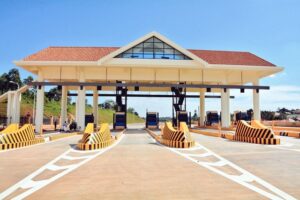Uganda, a landlocked country in East Africa, has been able to achieve significant progress in infrastructure development, thanks to the support of Exim Bank China. Over the years, the Chinese financial institution has funded and implemented several infrastructure projects in the country, ranging from road construction, railway projects, and the development of power plants.
Exim Bank China is a state-owned financial institution that provides financial support for Chinese companies to invest overseas. Its primary objective is to promote China’s economic development through international trade and investment. It operates through branches and representative offices in many countries across the world, including Uganda.
One of the significant infrastructure projects that Exim Bank China has implemented in Uganda is the construction of the Kampala-Entebbe Expressway. The expressway, which was opened in 2018, has significantly reduced the travel time between Kampala, the capital city, and Entebbe International Airport. The 51-kilometer road project was implemented by the China Communication Construction Company, a Chinese firm that was awarded the contract by Exim Bank China. The project cost about $476 million, and it was funded by a loan from Exim Bank China.

In addition to the Kampala-Entebbe Expressway, Exim Bank China has also funded the construction of the Karuma Hydropower Project. The power plant, located on the Nile River in northern Uganda, has a capacity of 600 megawatts and is expected to boost Uganda’s electricity supply. The construction of the project was also awarded to a Chinese firm, Sinohydro Corporation, and it was funded by a loan from Exim Bank China.
Exim Bank China has also played a significant role in the development of Uganda’s railway infrastructure. The Chinese financial institution has funded the construction of the Kampala-Malaba Standard Gauge Railway, a project aimed at improving the transportation of goods between Uganda and neighboring countries. The railway line, which is expected to cost about $2.3 billion, is being implemented by the China Harbor Engineering Company, another Chinese firm.
Apart from these significant infrastructure projects, Exim Bank China has also funded the construction of several other road projects in Uganda, including the Mbarara-Katuna road, the Tororo-Mbale-Soroti road, and the Kafu Bridge. These road projects have significantly improved Uganda’s transport infrastructure and have made it easier for people and goods to move within the country.
In conclusion, Exim Bank China has played a vital role in Uganda’s infrastructure development. The Chinese financial institution has funded and implemented several significant infrastructure projects in the country, ranging from road construction, railway projects, and the development of power plants. These projects have had a positive impact on Uganda’s economy and have helped improve the country’s transport infrastructure, power supply, and overall development. It is clear that Exim Bank China’s involvement in Uganda’s infrastructure development has been a significant boost to the country’s progress and development.









